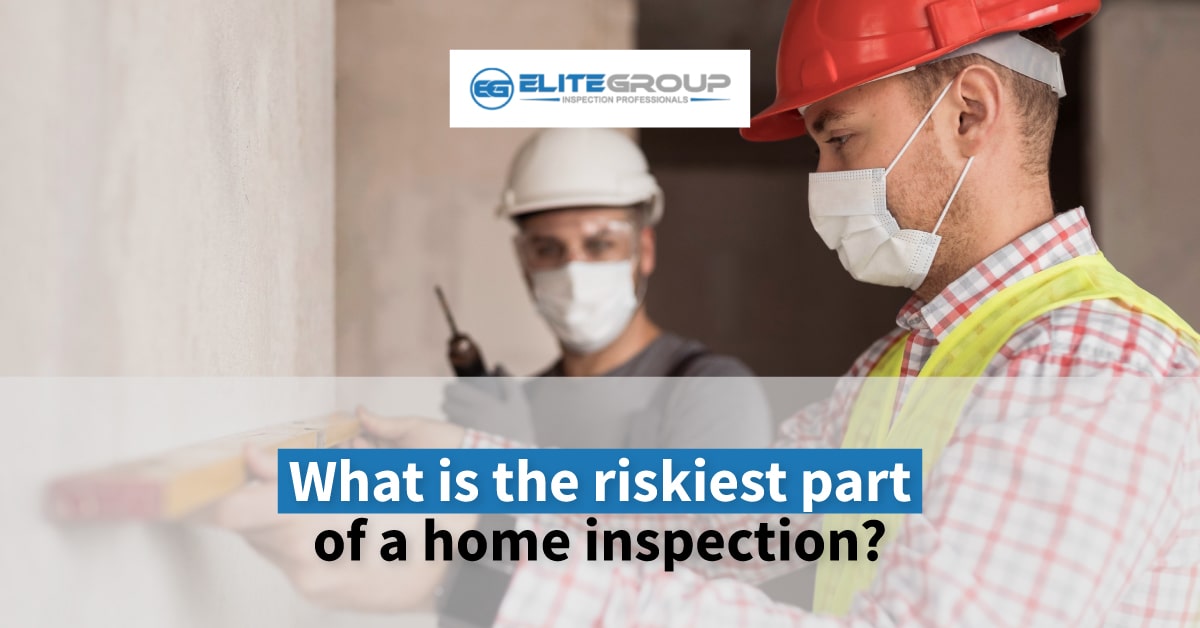What are some of the riskiest parts of a home inspection?
It’s important to get a home inspection before buying a house so you know what you’re getting into. Potential buyers can use this data to better evaluate the home and make a decision. However, home inspectors encounter numerous dangers and risks throughout the inspection process. San Diego home inspectors can take the essential safety measures to protect themselves and guarantee a secure and effective inspection by being aware of these risks. This blog will discuss some of the riskiest aspects of a home inspection that inspectors should be aware of.

Climbing ladders to inspect roofs or high areas
It’s crucial to check the roof while assessing a house to determine its condition and spot any potential problems. Accessing the roof may require climbing a ladder, which might be risky if sufficient safety precautions are not taken. Home inspectors frequently risk getting hurt while using ladders to assess roofs or other high areas.
The possibility of falling while using ladders to inspect roofs is one of the main risks. When an inspector is working at a considerable height, falls from ladders can cause severe injuries or even death. This risk increases if the ladder is not correctly positioned or secured or the roof is damp, slick, or unstable. Even experienced home inspectors might suffer mishaps; thus, they must take the appropriate safety measures to reduce the danger of falls.
Home inspectors should always check ladders before use to ensure they are in good condition to lower the danger of falls. Inspectors should also confirm that the ladder is positioned correctly on a flat, sturdy surface to avoid slipping or tipping. Inspectors should always climb the ladder with two hands and three points of contact, maintaining their bodies centered on the ladder.
A range of instruments and equipment, including cameras, measuring tapes, and spotlights, are frequently carried by home inspectors. These objects can fall and hurt the home inspector in San Diego or those below if they are not adequately secured. The risk of getting hurt by tools or equipment exists when using ladders to inspect roofs. Home inspectors should use tool belts or pouches to keep their hands free and their tools safe to reduce this risk.
Exposure to mold, asbestos, and other hazardous materials
While performing a home inspection, home inspectors frequently find these hazards; therefore, inspectors must be aware of the dangers and take the appropriate safety measures to safeguard themselves and others.
Home inspectors find mold as one of the risks during home inspections. It can grow in damp or humid areas like restrooms, crawl spaces, and basements. Many health difficulties, including allergies, respiratory problems, and in extreme cases, neurological disorders, can be brought on by mold exposure. Home inspectors must take the appropriate safety measures to reduce their exposure risk when confronted with mold. This can entail wearing safety gear like gloves and masks and employing proper ventilation to stop mold development.
Asbestos is another dangerous material that home inspectors could run into. Asbestos was widely used as insulation, floor tiles, and roof shingles until the 1970s. Asbestos exposure can lead to serious diseases like lung cancer and mesothelioma. If a house inspector discovers asbestos, they must exercise extreme caution to not release harmful fibers into the air by disturbing the substance. This can entail sampling the substance using specialized tools or advising more testing to find potential risks.
Lead-based paint, radon gas, and formaldehyde are some additional dangerous materials that home inspectors could come across. Certain substances can cause respiratory diseases, neurological symptoms, and even cancer in extreme situations. Residential property inspectors protect themselves and their clients. Proper ventilation and protective gear like gloves and masks may be needed to contain harmful particles.
Home inspectors need to be cautious in how they conduct themselves and adhere to the necessary safety precautions to reduce the danger of exposure to hazardous materials when conducting home inspections. Home inspectors must also keep up with the latest safety standards and laws to guarantee their clients the finest service possible. This can entail performing a comprehensive visual inspection of the site to spot potential dangers, sampling materials with the right testing tools, and proposing additional testing or remediation as necessary.
Electric shock or electrocution from faulty wiring or electrical systems
The risk of electric shock or electrocution due to defective wiring or electrical systems is one of the most significant concerns that home inspectors must deal with. Every home needs electricity; thus, it must operate properly and safely.
Home inspectors must evaluate the electrical system during a home inspection to ensure it is safe and in good operating condition. This includes inspecting the electrical panel, switches, outlets, and other parts. The inspector might be at risk if these parts aren’t working correctly.
Faulty wiring is one of the most typical reasons for electrical accidents during home inspections. Home inspectors must carefully inspect every wiring to ensure it is safe and in good shape. If any wiring is defective, it must be fixed immediately. An unsafe scenario caused by outdated or faulty wiring poses a risk of electric shock or electrocution.
Using improper or defective electrical equipment during home inspections is another frequent reason for electrical accidents. While checking electrical systems, home inspectors should always use the right tools and make sure they are in good working order.
Homeowners should replace any equipment that is damaged or not working correctly immediately to reduce the chance of receiving an electric shock.
Home inspectors could encounter various electrical risks and faulty wiring and equipment during inspections. This comprises old, inadequately installed, or overloaded electrical panels. Occasionally, upgrading or replacing electrical panels could be necessary to ensure they adhere to the most recent safety regulations.
Are you looking for a reliable home inspection company in San Diego? Elite Commercial inspections have got you! Schedule your inspection today with us, and have the most trustworthy experience for your home.





Leave A Comment